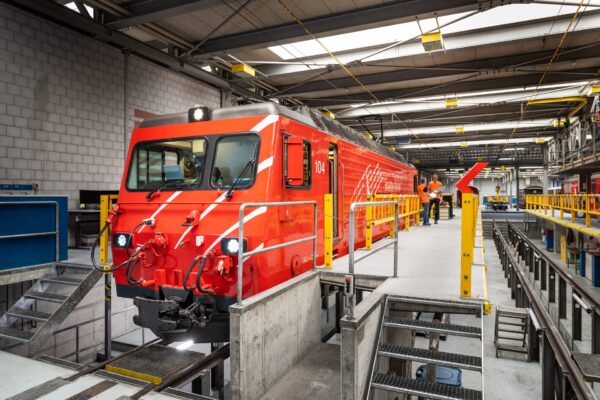
Rolling Stock Modifications
Enotrac has decades of extensive experience in the field of vehicle conversions. Thanks to numerous refit projects carried out in-house, the experts know the specific challenges of converting existing vehicles. The specific risks and critical paths on the timeline can thus be managed and taken into account accordingly.
Customers can rely on competent support in the planning and implementation of their refit projects. If desired, Enotrac can reliably take over management of the project.
Further services for Planning & Project Management
-
Project planning and management for vehicle conversions: Enotrac expertise
Enotrac has decades of experience in the successful planning and management of vehicle conversions in the rail industry. This expertise is the result of numerous internal refit projects in which Enotrac has mastered the complex requirements and challenges of converting existing rail vehicles. The depth of our knowledge and the breadth of our experience have made us a trusted partner for project planning and management of vehicle conversions.
Our specialists understand the specific needs of the rail industry and have an in-depth appreciation of the dynamics involved in modernising rail equipment and vehicles. This continuous contact with real-world projects has enabled us to successfully manage the specific risks and critical timelines associated with vehicle conversions. We recognise the sensitivity and scale of these projects and have the necessary skills and expertise to manage them effectively.
Our long-standing presence in the rail industry means that we are able to take into account the specifics of each refurbishment project and develop tailored solutions. Our aim is to provide our customers with the highest possible quality and efficiency at every stage of the refurbishment project. From initial design to final acceptance, we are committed to ensuring that the vehicle conversions run smoothly and meet the highest standards.
The importance of modernisation in rail transport
The rail transport industry is characterised by continuous development and a high degree of innovation. These ongoing advances pose a challenge that requires older rail vehicles to be regularly updated to the latest technology and in line with applicable standards. The modernisation of these vehicles covers a wide range of upgrades, including the integration of Wi-Fi, modern infotainment systems, air conditioning and other amenities that significantly increase passenger comfort. This is essential to ensure that rail transport is not only functional but also highly appealing to today’s passengers.
The ever-changing regulatory landscape and safety standards are another driving factor behind rail modernisations. These requirements evolve over time, forcing existing rolling stock to be adapted to meet current regulations. These adaptations include barrier-free access and additional safety precautions to comply with the latest regulations. Ensuring passenger safety is of the utmost priority, and modernisations play a crucial role in achieving this goal.
However, rail modernisations are not only aimed at ensuring compliance with the latest regulations and standards. They also aim to increase the efficiency of rail vehicles in order to benefit operators and the environment. This can be achieved through measures such as optimising energy consumption, improving aerodynamics or reducing weight. These adjustments are often crucial to reducing operating costs while minimising the impact on the environment. This shows how modernisation in rail transport also promotes ecological responsibility.
In this dynamic and ever-changing environment, modernisations are an indispensable process that helps to ensure that rail vehicles remain competitive and meet today’s requirements. Efficiency, safety and comfort are the main focus here, in order to offer passengers a modern and pleasant travel experience. Modernisations in rail transport thus play a central role in maintaining and increasing the relevance of this mode of transport in a continuously developing world.
The role of the project manager in vehicle conversions
The project manager in vehicle conversions plays a crucial role in the successful implementation of conversion projects in the rail industry. His tasks are diverse and require a deep understanding of the specific requirements and challenges of this industry.
Planning and coordination
Planning marks the first and most essential step in the implementation of a vehicle conversion project. In this phase, Enotrac project managers are responsible for defining clear objectives, creating detailed schedules and calculating budgets. They are also responsible for coordinating the various teams and resources to ensure that all activities run smoothly. Particular attention is paid to identifying interfaces with other projects and departments in order to exploit synergies and avoid conflicts.
Quality control
Our project managers meticulously monitor the progress and quality of the work performed. Regular inspections, extensive testing and thorough quality checks are part of this process. The aim is to ensure that all work meets the specified quality standards and requirements.
Budget management
One of the key tasks of our Enotrac experts is to control costs during the course of the project. They are responsible for ensuring that the project budget is adhered to and that no budget overruns occur. This budget management requires precise monitoring of financial resources and the efficient use of available resources.
Risk Management
In every project, unforeseen problems and delays can occur. Enotrac project managers are responsible for identifying potential risks at an early stage and developing appropriate measures to overcome these challenges. This includes devising contingency plans and ensuring suitable fallback options to keep the project on track.
Communication
Our project managers ensure efficient communication between all relevant stakeholders. This includes not only customers and internal teams, but also external partners. Regular meetings, detailed status reports and actively solving any problems or conflicts that arise are key elements in this area.
Acceptance and handover
At the end of the project, our project manager is responsible for the acceptance of the converted vehicles. This includes thoroughly checking whether all the set goals have been achieved, the quality standards have been met and all the necessary documents and certificates are available. After successful acceptance, the vehicles are handed over to the customer or operator to ensure a smooth transition to the operating state.
Our project managers are the driving force behind successful vehicle refit projects and ensure that projects are completed on time and within budget, while maintaining the highest quality standards.
Reliable support with planning and project management
Customers who are confronted with the challenges of refit projects can always count on Enotrac’s reliable and competent support in planning and implementation. Our main focus is on supporting your projects from the initial planning to the successful implementation. If necessary, we not only take on partial aspects, but also comprehensive project management. Our in-depth expertise in planning and implementing refit projects is illustrated by the following two projects.
Door refit for SBB passenger coaches: Innovative modernisation of a 30-year-old fleet
An impressive project that demonstrated our experience and expertise is the modernisation of Swiss Federal Railways (SBB) passenger coaches that were over 30 years old. In this project, the doors of these coaches were electrically and mechanically integrated using the innovative IFE door system. This is an extremely ambitious undertaking because it involves an extensive fleet of passenger coaches of various types, including restaurant cars, panorama cars and driving trailers. All of them are undergoing a comprehensive modernisation.
Enotrac worked on this project as a subcontractor of IFE and coordinated the extensive refit measures. This included the analysis of the existing carriage scheme and the integration of the IFE schemes. The Enotrac experts created a new carriage scheme and worked together with an external designer on the mechanical interfaces between the IFE door system and the carriage body. They carried out calculations for the connections, designed control panels for IFE control units and created detailed manufacturing drawings. They also supervised the conversion on site and created precise conversion instructions. The Enotrac experts also monitored the installation control and were responsible for the type test specification and execution.
The Enotrac project managers played a key role in the approval of the project, prepared the necessary approval documents and provided support during their submission. In this process, our experts took over communication with the Federal Office of Transport (BAV) on behalf of IFE, where this was expedient.
Investigation into the partial replacement of the ICN control technology: Ensuring operation and reliability
Another project was the investigation into the partial replacement of the ICN control technology of the SBB. The ICN trains (RABDe 500) require modernisation of the control technology (MITRAC), as it has reached the end of its lifecycle. The availability of certain components is no longer guaranteed, which jeopardises the continuous operation of the trains. In this project, some of these modules are to be replaced to ensure the reliability and operation of the remaining modules. Our project planning and management experts are specialised in efficiently and successfully implementing the modernisation of control technology. To ensure the success of the project, Enotrac first had to create a reliable starting point. This was done by creating a comprehensive overview of the control technology, in which each I/O module was classified according to its safety relevance, after analysing the signals processed by the module. After assessing the need for modules for the continued operation of the ICN fleet, the modules to be replaced were identified.
It was also important to compare the replacement modules available on the market and to evaluate their integration capability. Two variants were considered, namely the use of a multifunction vehicle bus (MVB) and a change to Ethernet.
In this project, Enotrac was able to contribute its many years of experience in technical and homologation matters for rail vehicles. The result is a well-founded recommendation for the partial replacement of the control technology, which is homologation-capable and realistically costed.
Our role in these projects ranges from planning and coordination to quality control and budget management. We are your trusted partner, ensuring that your refit projects are completed on time and on budget. Enotrac is at your side to take on the challenges of your projects and help you succeed.
Enotrac’s comprehensive services
Enotrac offers comprehensive services in project planning and management for the rail industry. From careful planning to budget management and quality control, our experts specialise in various aspects of vehicle conversions. We have technical expertise in electrics, electronics, mechanics, and safety systems and can take on responsibility for sub-projects or the entire project. We ensure efficient budget management and have experience in risk management. Communication with all parties involved is of great importance to us.




